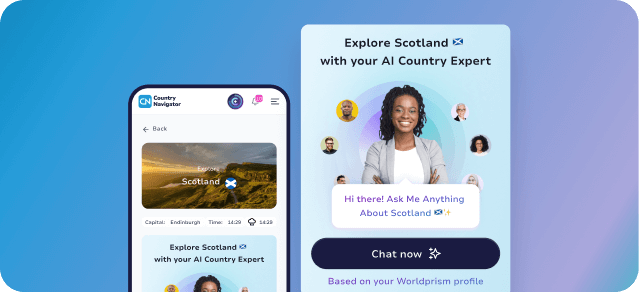Set your new hires up for success
Why Cultural Intelligence Must Be a Core Competency in the NHS
.jpg)
A recent report from the National Guardian’s Office has highlighted a critical shortfall in the NHS: a lack of cultural intelligence. After speaking with over 12,000 NHS staff, the conclusion is clear – without deeper understanding and tools for navigating cultural differences, the system will continue to underperform for both patients and its global workforce. This is not an isolated finding. The Independent recently reported that 36% of NHS doctors and 30% of nurses and health visitors are international. In total, nearly 300,000 of the NHS’s 1.28 million staff are foreign-born, not counting second or third-generation British professionals with diverse cultural heritages.
Yet despite this diversity, many of these professionals are held to different standards – often because of unspoken cultural expectations that create confusion, conflict, or disengagement. The problem isn’t difference – it’s the failure to understand and use difference effectively.
Real Consequences of Cultural Misunderstanding
When the UK began recruiting nurses from the Philippines in the early 2000s, hospital managers quickly encountered a culture clash. In Filipino culture, it’s normal for family members to provide emotional and practical care at a patient’s bedside. This contrasted sharply with UK expectations, where nurses are responsible for most care tasks and families are often less involved in hospital settings.
Filipino nurses found UK families’ detachment shocking. British staff misread Filipino nurses’ reluctance to step in as laziness or poor work ethic. Morale dropped, and managers found themselves with a workforce they didn’t know how to lead.
This example is not unique. Over its 77-year history, the NHS has addressed surface-level diversity – language, dress, and customs – but it has yet to consistently tackle underlying cultural values and expectations. That’s where cultural intelligence (CQ) comes in.
What Is Cultural Intelligence?
Cultural intelligence goes beyond awareness and inclusion training. It’s the measurable capability to relate and work effectively across cultures. CQ is made up of four levels:
1. Attitude
The foundation of CQ is an openness to difference. NHS professionals must be willing to recognize that their way of working is just one of many. A culturally intelligent mindset says: What’s normal to me might be strange to someone else…and that’s okay.
2. Awareness
Once open to difference, staff must begin to observe how culture affects expectations and behavior. Is a colleague’s indirect communication evasive, or just culturally appropriate? Is a nurse avoiding eye contact out of disrespect, or because it’s considered polite in their culture?
Awareness means pausing to interpret behaviors through a broader lens.
3. Knowledge
This is where tools like Worldprism™ from Country Navigator become invaluable. Worldprism™ is a cultural profiling framework that analyzes key dimensions like communication style, approach to authority, risk, time, and problem-solving.
By comparing your profile with an individual, team, or national culture, you can identify specific differences that could cause friction or misunderstanding.
4. Skills
The final level is application. It’s about adjusting your communication and behavior to connect with others better. For instance, if you know a colleague is risk-averse, you tailor how you present a treatment option. If a doctor tends to communicate implicitly, you double-check that patients fully understand their diagnosis or care plan.
These adaptations are not just about empathy, they improve clarity, reduce errors, and lead to better patient outcomes.
Inclusion Is More Than Diversity
True inclusion means leveraging differences to make teams more effective, not just more diverse. For example:
- A risk-taking nurse may challenge outdated practices and innovate care delivery.
- A risk-avoiding colleague might ensure standards are met and safety is prioritized.
- A direct communicator is likely to ensure clarity in emergencies.
- An indirect communicator may excel at managing sensitive discussions with families.
Different cultural styles can complement each other if you have shared understanding and intentional collaboration.
Structured Approaches Work
Cultural intelligence isn’t guesswork. Two proven models help teams approach cultural difference with clarity and structure:
Worldprism’s 3R Framework
1. Relating – How we interact with people and teams
2. Regulating – How we interact with processes and structures
3. Reasoning – How we interact with problems and challenges
By exploring these categories of three dimensions each, teams can create shared norms, reduce conflict, and align expectations.
The second model aims to support application of culturally intelligent skills, supporting CultureFlex – the ability to adapt your style in an appropriate way.
ABCDE Adaptation Strategy
- A – Adapt: One person adjusts to another’s style. Common in patient care.
- B – Blend: Both parties move toward each other. Useful in long-term teams.
- C – Co-create: Teams collaboratively build a shared culture. Ideal for high-stakes collaboration.
- D – Deny: Ignoring cultural differences may be unavoidable in crisis but comes at a cost.
- E – Enforce: Leaders impose a specific approach. Sometimes necessary but requires strong communication and emotional intelligence.
Cultural Curiosity Is a Skill
Improving CQ requires developing the following:
- Listening with awareness: Recognizing your own cultural filters and interpreting others’ behavior through their lens.
- Critical thinking: Understanding that different thinking processes, for example, linear vs. circular, can reach equally valid conclusions.
- Tolerance for ambiguity: Being comfortable not having all the answers immediately.
- Humility: Acknowledging that “normal” is subjective, and your way isn’t always the best.
In one culture, eye contact signals trust; in another, it’s disrespectful. In the UK, it’s acceptable, even encouraged, for patients to challenge doctors. In others, the doctor’s word is final. These are not minor details. They shape everything from diagnosis to compliance to satisfaction.
The NHS Is Already Global
The NHS employs staff from 214 nationalities. That’s 21 more than the number of United Nations member states. And that’s just national culture. Age, religion, gender, profession, and socio-economic background also shape workplace expectations.
If every team in the NHS developed just a baseline level of cultural intelligence, the impact would be enormous:
- Faster decision-making
- More transparent accountability
- Higher staff engagement
- Improved patient communication
- Better care outcomes
Cultural intelligence isn’t a “nice to have.” It’s an operational necessity for an organization as large, diverse, and critical as the NHS. Cultural intelligence training through tools like Worldprism™ and Country Navigator provides measurable ways to improve collaboration, leadership, and patient care. For an NHS facing increasing pressure and growing diversity, CQ isn’t just a solution—it’s a strategic imperative.
We’ve got over three decades of experience supporting over 1 million people worldwide. We’re passionate about delivering change; how can we help you?

Matthew Maclachlan
Matthew MacLachlan is a seasoned expert in cultural intelligence and inclusion, currently serving as the Head of Learning Innovation at Country Navigator. With over two decades of experience, he designs innovative learning solutions to foster culturally intelligent and inclusive organizations. Matthew's career spans roles such as Learning and Development Manager at the University of Surrey, Head of Intercultural and Communication Skills at Learnlight, and Intercultural Account Manager at Farnham Castle. An advocate for practical, research-backed learning, he co-hosts the "Hippo Question Podcast" on cultural intelligence and inclusion. More posts by Matthew MaclachlanRelated articles
Ready to get started?
Kickstart your cultural intelligence journey and try our
no-obligation free trial for 14 days
Join companies already using Country Navigator




COMMENTS